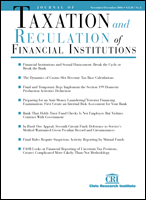A New Tax Regime for CFCS: Who Is GILTI?
Author: Elizabeth V. Zanet.; Stanley C. Ruchelman.
Source: Volume 31, Number 03, Spring 2018 , pp.17-28(12)

< previous article |next article > |return to table of contents
Abstract:
When financial analysts of a financial institution review the tax provision of potential customers incident to a financial transaction, the focus typically is directed at current and deferred taxes, the quantum of earnings permanently invested abroad, and the quality of a booked tax benefit. The complexity of the analysis has increased as a result of the 2017 Tax Cuts and Jobs Act. U.S. tax law now contains a new minimum tax regime applicable to controlled foreign corporations and provides tax benefits for domestic businesses using U.S. “intangibles” to exploit foreign markets. The former is known as GILTI and the latter is known as FDII. Together, these provisions change the dynamics of cross-border taxation and their effect is difficult to quantify in the absence of IRS guidance. This article explains the mechanisms adopted by Congress to promote U.S. business activity and penalize U.S. taxpayers that engage in businesses abroad through controlled foreign corporations that have little or no need for plant, property, or equipment.Keywords: cross-border taxation, global intangible low-taxed income (GILTI), foreign-derived intangible income (FDII), controlled foreign corporations, “Subpart F,” foreign tax credit
Affiliations:
1: Ruchelman P.L.L.C.; 2: Ruchelman P.L.L.C..